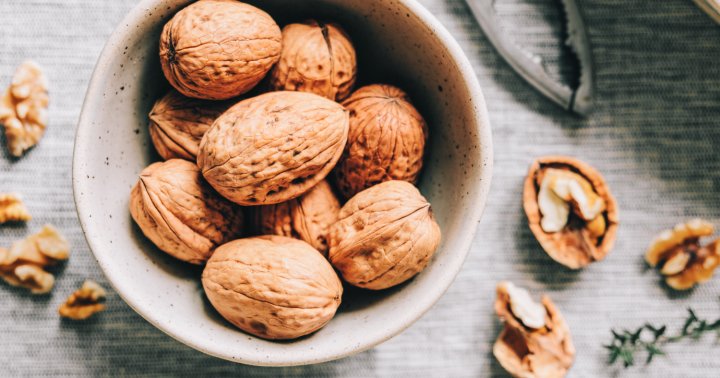
Are Whole Walnuts Heart Healthy? Add This One To Your Diet For Better Heart Health
by Caroline Muggia mindbodygreen.com
We’re nuts about walnuts. Experts say they’re at the top of the list for the healthiest nuts out there as they contain a high amount of alpha-linolenic acid (ALA), an omega-3 fatty acid known to lower inflammation and boost brain and heart health. These are also high in antioxidant polyphenols, which research suggests may help slow the growth of breast cancer.
So what is it about these little nuts that make all the difference? A new study published in the Journal of the American Heart Association may have some insight on which part of the walnuts contributes to better heart health. To figure this out, the researchers assigned participants to three different low-saturated fat diets, one which included whole walnuts, another which did not contain walnuts but had the same ALA and polyunsaturated fatty acids content, and third that had another type of fatty acid but no walnuts. After six weeks, the researchers found that all of the diets had a positive impact on cardiovascular risk factors (blood pressure, brachial pressure, cholesterol, arterial stiffness), but in particular, the diet with whole walnuts showed the most significant benefits including lower central diastolic blood pressure. “When participants ate whole walnuts, they saw greater benefits than when they consumed a diet with a similar fatty acid profile as walnuts without eating the nut itself,” said Penny Kris-Etherton, Distinguished Professor of Nutrition at Penn State in a statement. “So it seems like there’s a little something extra in walnuts that are beneficial—maybe their bioactive compounds, maybe the fiber, maybe something else—that you don’t get in the fatty acids alone.” The link between eating whole walnuts and lowered central blood pressure (the pressure moving towards your heart) is especially important as central blood pressure levels are a marker for the risk of developing cardiovascular disease, which means that eating whole walnuts may have lowered the participant’s risk of developing CVD. Based on this news it seems like we could all use more walnuts in our life. If eating raw walnuts is not your cup of tea, try roasting them with a little salt and honey or add them to your smoothies. There are tons of ways you can incorporate these super-powered nuts into your diet without having to eat them straight.
